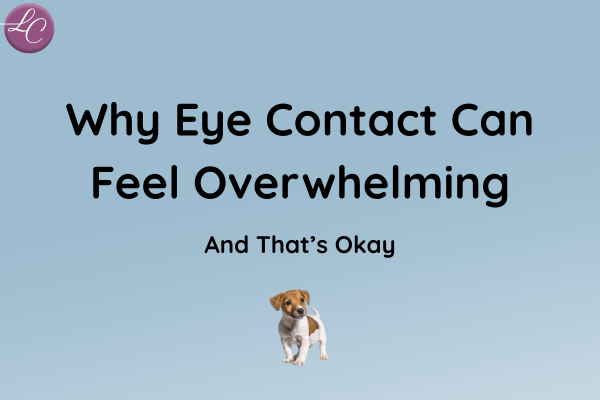Eye Contact Can Be Overwhelming
Have you ever tried to hold someone’s gaze and felt your whole body tighten? As if their eyes were shining a spotlight straight into your soul?
If so, you’re not alone.
Why eye contact can feel overwhelming is something many neurodivergent people struggle to explain — yet it shapes countless social moments.
Today, I want to explore what it’s really like, and why it’s absolutely okay to look away.
The Sensory Intensity of Eye Contact
For many neurodivergent people, eye contact isn’t just “looking at someone.”
It’s a flood of sensory information — facial expressions, micro-signals, emotional cues — all processed at once, sometimes painfully so.
Imagine trying to have a conversation while someone shines a torch directly into your eyes. Your heart might race, your skin prickle, and your thoughts scatter. That’s what eye contact can feel like for some of us: too bright, too raw, too much.
It’s Not Rudeness — It’s Regulation
In many cultures, eye contact is seen as respect. But for neurodivergent people, avoiding it often isn’t about disrespect — it’s about staying regulated enough to listen and engage.
Looking away helps us process words without the overload. It’s a way of caring for ourselves so we can stay present in the moment.
Stories From Within
I’ve spoken to so many neurokin who’ve described forcing themselves to maintain eye contact only to feel their brain start skipping, like a record with a scratch.
One told me it felt like being dissected — exposed in a way that shut down their ability to even hear the words.
Looking away isn’t avoiding connection. It’s making connection possible.
Supporting Yourself and Others
If you find eye contact hard:
- Try looking at someone’s nose or forehead instead.
- Use nods or small gestures to show you’re listening.
- Let people know that looking away actually helps you stay tuned in.
And if you’re supporting someone else? Release the expectation that “good eye contact” equals good communication. Connection is so much bigger than that.
Embracing Different Ways of Being Present
You are not broken for finding eye contact difficult.
You’re simply wired differently.
Let’s normalise looking away, fidgeting, or closing our eyes while we listen — they’re all valid, beautiful ways of connecting.
Watch This Video
I unpack this even further in my video Why Eye Contact Can Feel So Hard (and That’s Okay).
It’s a reassuring watch if you’ve ever worried that your way of being is “wrong.”
Let me know what resonated for you… and if you feel inclined, please like and share the video.

